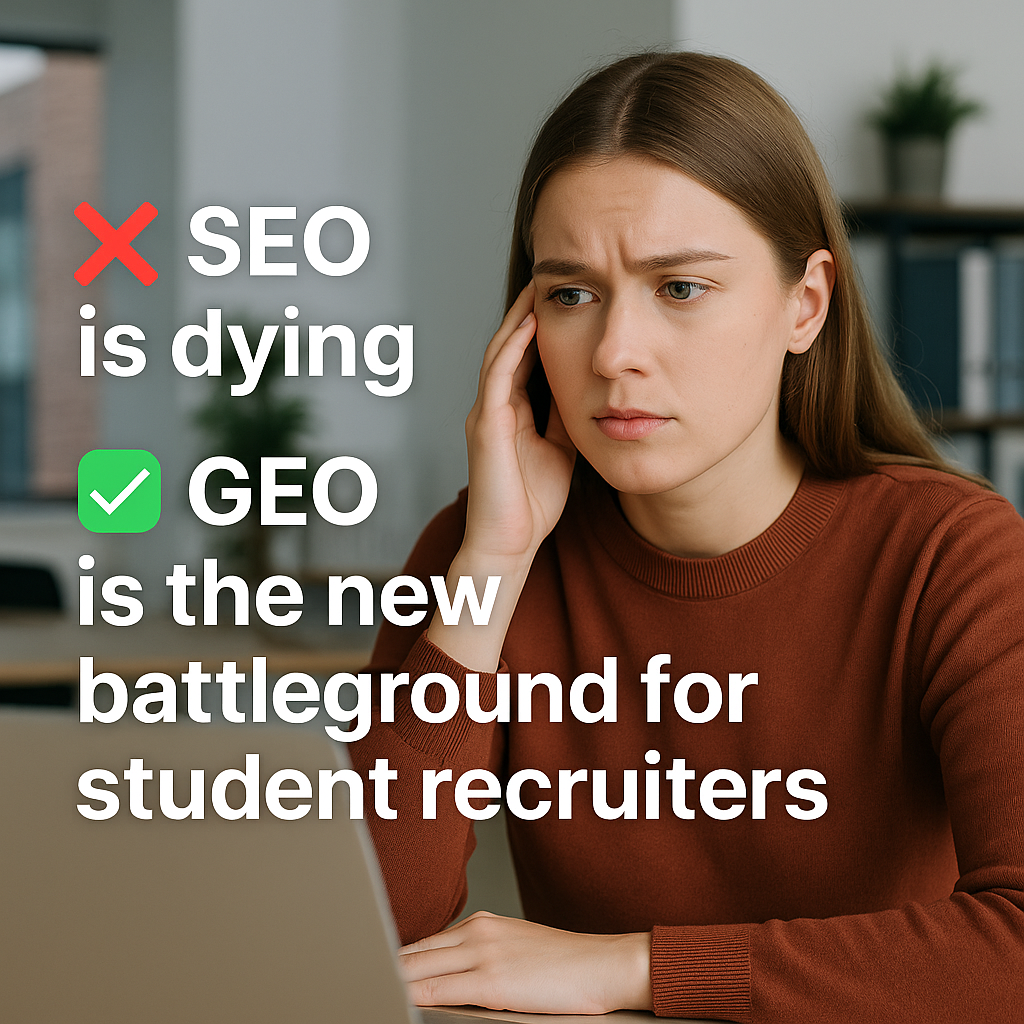I’m writing this because I don’t want our university clients to fall behind.
Every year, student recruitment gets harder. Digital habits change. Attention spans shrink. And now, with the rise of AI-powered search engines and chatbots, there’s a new disruptor at the gates: Generative Engine Optimisation (GEO). You might not have heard of GEO yet, but you will. And when you do, I want you to be ready.
Because here’s the truth: SEO, as we know it, is quietly dying. And AI is killing it.
Why this matters to me (and to you)
I’m Dom, and at Student CRM I work directly with dozens of UK universities to help turn interest into action. That means helping prospective students find your Apply, Register, Enquire and Book an Event forms through your website.
For years, I’ve supported natural search strategies. Your organic traffic from Google has been gold dust. When a student searches, lands on your site, and fills in a form powered by Student CRM, everyone wins.
But now, I’m seeing a shift that changes everything.
Students aren’t just searching anymore. They’re asking. Tools like ChatGPT, Google’s AI Overviews, Perplexity and Gemini are becoming the first stop for student decision-making. They’re asking questions like:
“Which unis have the best accommodation for first years?”
“What universities near Birmingham have good student support?”
Google search results showing AI generated response to ‘universities offering mental health support and flexible timetables’.
ChatGPT response listing UK universities with strong mental health support and flexible timetables for first-year students
AI doesn’t return a list of websites like Google used to. It generates an answer, pulling content from trusted sources it understands. And if your university’s content hasn’t been written with those AI systems in mind, it might not be mentioned at all.
What Is GEO (and why should you care)?
GEO is Generative Engine Optimisation. It’s how you structure and write your content so that AI models can understand it, select it, and include it in their answers.
Where SEO focused on keywords and link-building, GEO focuses on:
Answering real student queries in plain, helpful language
Creating well-structured content that matches user intent
Building trust with AI models so they surface your brand
This isn’t a trend. It’s the next chapter of how discovery works online.
If a student asks ChatGPT,
“Which unis offer strong placement years for psychology?”
...you need your university mentioned in the response. Otherwise, you’re not even in the conversation.
Why I’ve got skin in the game
I’m not writing this post for clicks or to jump on the next big thing. I’m writing it because GEO directly affects the success of the work I do with you.
If your prospective students can’t discover your forms through natural search, your recruitment funnel weakens. The web pages we help you build, the form journeys we refine, and the student data you rely on to convert applicants - it all depends on visibility.
And if AI tools are the new gatekeepers, then we need to optimise for them, not just for Google.
This matters to me personally, because I built Student CRM to make recruitment easier, more effective, and more student-friendly. If I see something that threatens that, I speak up. This is one of those moments.
What you can do now
GEO doesn’t replace SEO, but it does require a shift in approach. Here’s where to start:
Review your top-performing landing pages. Are they written in a way that clearly answers real questions students ask?
Write for clarity and completeness. AI tools favour pages that explain rather than market.
Structure your content for AI readability. Use clear headings, bullet points, and natural language that reflects how students speak.
Track your visibility in AI tools. Search your uni in ChatGPT or Perplexity and see what comes up. You might be surprised.
One final thought from Dom
If your strategy relies on organic discovery, you can’t afford to ignore this. AI-generated search is not a future threat. It’s already here, shaping student decision-making today.
And I’ve got skin in the game. If AI tools don’t surface your pages, your forms don’t get used, and your student engagement suffers.
Let’s stay ahead of this. Let’s make sure your content gets found - not just by Google, but by the new generation of AI-powered tools that students are already using.
Want help thinking through GEO for your university’s content? Just give me a shout. I’m Dom, and I’m here to help.



